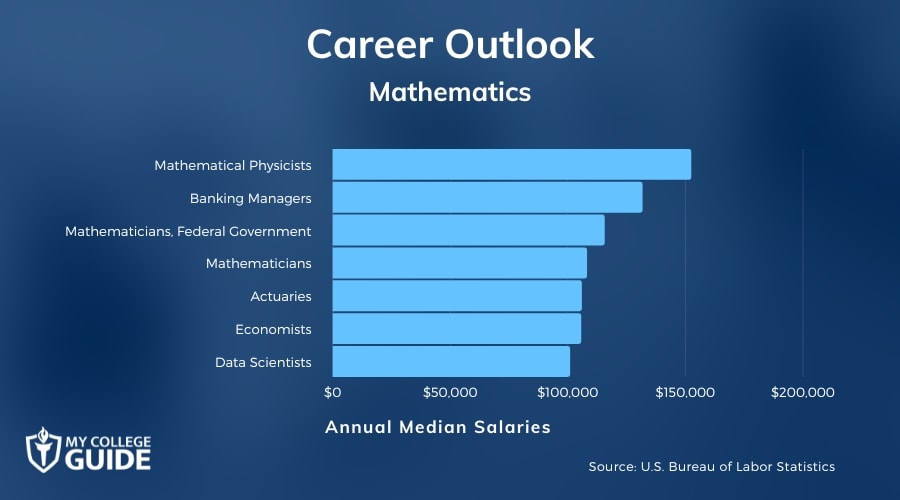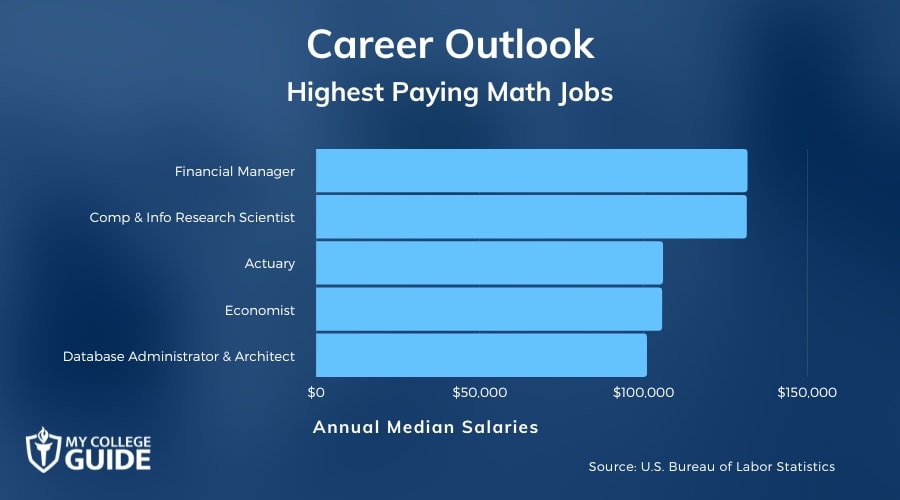For those with an analytical mind and a knack for working with numbers, a degree in mathematics can open the door to lucrative math careers across a number of industries.

If you’re curious as to what to do with a math degree, it’s important to know that from scientific research and education to working in the fast-paced corporate world, mathematics is a highly-diverse field that has great potential for future growth.
Editorial Listing ShortCode:
Due to the diversity of the career paths associated with mathematics, it can be a good idea to get a broader understanding of the various jobs for math majors.
What Can You Do With a Mathematics Degree?

While you may not find a job application specifically for “mathematics”, the skills that you will learn in this degree program will prepare you for professional work in a wide range of industries.
After graduation, you may find employment in business, research, education, meteorology, or the financial world. You can opt to become a mathematician, actuary, computer system analyst, or even a math teacher.
Editorial Listing ShortCode:
According to the U.S. Bureau of Labor Statistics (BLS), the annual salary for math professionals can vary widely. While some entry-level positions offer median wages near the national average, some professional mathematics careers have annual salaries that can exceed six figures.
When planning out your future career goals, it is important to keep in mind that experience and educational level can play a large role in the pay that you can expect to receive when applying to jobs with a mathematics degree.
10 Things You Can Do with a Degree in Math
Earning a degree in math may open up a variety of opportunities in many fields. Graduates with a math degree may work heavily with data, algorithms, computer systems, statistics, research, and more.
According to the Bureau of Labor Statistics, the median annual wage for mathematicians is $112,430. The following career paths may be an option after completion of a math degree.
1. Mathematician

Education Requirement: Bachelor’s degree
Projected Job Growth: 31%
Mathematicians may work in many fields such as research, development, education, healthcare, and more that require data analysis.
Mathematicians may, to give an example, research or teach mathematical theories at the academic level, or even help design experiments for testing and developing products. They may also collect and analyze data in a variety of fields ranging from employment and energy consumption to crop yields.
2. Statistician

Education Requirement: Master’s degree
Projected Job Growth: 31%
Statisticians typically work with mathematicians to analyze data and create statistical models which help solve problems in a wide variety of industries.
They may use statistical software to develop models and create visual representations of possible outcomes, or even use collected statistical data to inform politicians of important topics that affect the public.
3. Computer Systems Analysts

Education Requirement: Bachelor’s degree
Projected Job Growth: 9%
Computer systems analysts analyze an organization’s computer systems and procedures. They then work to design improvements to ensure the system works efficiently for the company.
Computer system analysts will work with managers, research technologies, analyze the cost and benefits of specific IT systems, and plan ways to add functionality to a system. Once new systems are implemented, analysts will test and write instructions and manuals for using the system.
4. Financial Manager

Education Requirement: Bachelor’s degree
Projected Job Growth: 17%
Financial managers are responsible for overseeing and managing the financials of businesses. Their typical duties can include preparing forecasts, business activity reports, and financial statements, as well as analyzing data to maximize profits.
Financial managers also have extensive knowledge of tax law, as well as industry-specific regulations. They will also be heavily involved in advising senior managers and budgeting to reduce costs.
5. Postsecondary Teacher

Education Requirement: Doctorate or PhD
Projected Job Growth: 12%
Postsecondary teachers, or professors, typically instruct students at the university or college level. They may also conduct and publish research.
Editorial Listing ShortCode:
Postsecondary teachers may develop instructional lesson plans for courses, plan assignments, assess student progress, advise students, work with colleagues and faculty to optimize learning outcomes, and even serve on committees, especially if they are tenured.
6. Actuary

Education Requirement: Bachelor’s degree
Projected Job Growth: 21%
Actuaries use a blend of mathematics, statistics, and financial theories to analyze risk and uncertainty. They may perform risk analysis for both businesses and personal clients.
They may analyze statistical data and examine the probability of liabilities such as natural disasters, death, accidents, and sickness, and what the economic costs of these may be. Many actuaries work for insurance companies in order to determine the costs of potential events.
7. Software Developer, Quality Assurance Analyst, or Tester

Education Requirement: Bachelor’s degree
Projected Job Growth: 25%
Software developers, quality assurance analysts, and/or testers design, develop, and test computer applications. Software developers may create models and diagrams to illustrate computer code needed for a project, or even write code themselves. They may also design aspects of a system and help that system function as a whole.
8. Data Scientist

Education Requirement: Bachelor’s degree
Projected Job Growth: 36%
Data scientists use specific techniques and models to extract insights from data for various projects. They also collect and categorize data, making it readable for software programs.
Data scientists also help develop algorithms for machine learning in order to make predictions related to models. Data scientists can work in a variety of fields, such as machine learning, marketing, or even in research for academic institutions.
9. Operations Research Analyst

Education Requirement: Bachelor’s degree
Projected Job Growth: 23%
Operations research analysts use mathematics and mathematical data to help organizations solve problems, allocate resources, forecast the effects of changes, and more.
They develop and test models and analytical tools, analyze relevant data, identify problems to be solved within operations and projects, and more. Operations research analysts also write reports and memos to present findings to managers or other officials on their discoveries, which can help solve an operational problem.
10. Database Administrator and/or Architect

Education Requirement: Bachelor’s degree
Projected Job Growth: 9%
Database administrators and architects design or organize systems to store data securely. This can include all types of data, such as financial information, shipping records, and more.
Editorial Listing ShortCode:
They also help back up data to prevent the loss, as well as make modifications to database structures when needed. Along with overseeing the data systems, they may also code data architecture, integrate infrastructure, and/or check for errors.
Careers That Involve Math

Math is important for a wide variety of careers – even some you may not expect. Here are several careers that require math, but not specifically a math degree:
- Air Traffic Controller: Air traffic controllers coordinate the movements of planes and other air traffic in the sky and during landing and take off. Mathematics is used to quickly calculate distances and altitudes.
- Architect: Architects design and construct safe and functional buildings, homes, and other structures. Mathematics is used to calculate the design of structures that will remain stable and safe.
- Biostatistician: Biostatisticians analyze statistical data and design research studies and clinical trials for biomedical and pharmaceutical fields.
- Bookkeeper, Accountant, or Auditing Clerk: Bookkeeping, accounting, and auditing clerks produce financial records and record financial transactions for organizations. They may also update statements and check for accuracy in reports.
- Chemist: Chemists study all types of chemical reactions, which requires balancing the equations of chemical reactions, as well as calculating energy amounts during reactions and reactant quantities.
- Climatologist: Climatologists study the climate and how it changes through periods of time. This field also involves working with large amounts of data and climate models.
- Economist: Economists analyze the distribution of resources throughout economies, such as waste, raw materials, food, and more. Analyzing mathematical and statistical data sets plays a key role in this field.
- Market Research Analyst: Market researchers help companies understand their ideal audience in order to sell products. They routinely analyze statistical data in order to compare past sales with predicted future sales, as well as gather competition data.
- Nuclear Engineer: Nuclear engineers help develop and operate nuclear power plants, as well as devise the best use of radioactive materials. Nuclear safety, neutron transport, and the computer code realm of nuclear engineering require a high amount of math.
- Urban Planner: Urban planners create plans for the development of land into roads and other infrastructure. Mathematics is used in the design process, as well as when using mathematical models to forecast future population needs.
This is a small sample of the various careers that use high-level math every day.
Mathematics Careers & Salaries

Mathematics is an integral part of many different industries, and this will continue to be the case as advanced technologies and a changing marketplace affect the world of business and research.
In the information below, you will find a list of the top 40 math careers & salaries according to data from the U.S. Bureau of Labor Statistics (BLS):
| Careers | Annual Median Salaries |
| Mathematical Physicists | $152,430 |
| Banking Managers | $131,710 |
| Mathematicians, Federal Government | $115,610 |
| Mathematicians | $108,100 |
| Actuaries | $105,900 |
| Economists | $105,630 |
| Data Scientists | $100,910 |
| Mathematical Engineers | $100,640 |
| Financial Risk Specialists | $100,000 |
| Statisticians | $95,570 |
| Meteorologists | $94,570 |
| Personal Investment Advisers | $94,170 |
| Business Analysts | $93,000 |
| Corporate Statistical Financial Analysts | $91,580 |
| Statisticians, Insurance Carriers and Related Activities | $83,820 |
| Operations Research Analysts | $82,360 |
| Pension Examiners | $81,410 |
| Budget Analysts | $79,940 |
| Mathematics Professors | $77,580 |
| Credit Risk Analysts | $77,440 |
| Financial Specialists | $77,300 |
| Cost Estimators | $65,170 |
| Stock Brokers | $62,910 |
| Vehicle Damage Appraisers | $62,680 |
| Executive Assistants | $62,060 |
| Real Estate Brokers | $62,010 |
| High School Math Teachers | $61,820 |
| Property Appraisers and Assessors | $61,340 |
| Billing Department Supervisors | $60,590 |
| Tax Examiners | $56,780 |
| Claims Adjusters, Direct Health and Medical Insurance Carriers | $50,490 |
| Economist Research Assistants | $49,720 |
| Actuarial Assistants | $48,160 |
| Financial Reserve Clerks | $46,900 |
| Accounts Receivable Assistants | $45,560 |
| Underwriting Assistants | $45,520 |
| Invoice Clerks | $38,330 |
| Banking Services Clerks | $37,840 |
| Accounts Collectors | $37,700 |
| Bank Tellers | $36,310 |
With the high demand for skilled math professionals, the mathematics career outlook continues to look overwhelmingly positive.
When researching math career ideas and debating what can I do with a math degree, it is helpful to check out reputable online resources such as the BLS. For example, the BLS predicts that mathematicians will see a 31% occupational increase over the next 10 years. Those interested in careers as actuaries will see 21% over the same time period.
Editorial Listing ShortCode:
Depending on the employer, you may need additional education or work experience to qualify for some of these jobs. A mathematics degree program can provide you with a marketable skill set that is essential throughout the workforce. Across a variety of professional industries, math is at the core of business success and scientific research.
You can also view our Careers in Marketing and Careers in Nursing guides for more options.
Math Licensure and Certifications

Earning a specific license or certification can highlight to employers that you have the necessary experience and competence to excel in your career. While many licenses aren’t mandatory, a license is required to become a teacher.
As for professional certifications, two to consider are the Certified Analytics Professional (CAP) certification and the IBM Data Science Professional certification. The CAP certification accentuates competency in analytics, while the IBM Data Science certification highlights competency in data science methodology.
While neither certification is mandated, receiving them may lead to higher career opportunities and positions, as well as a more lucrative salary.
Is Financial Aid Available?

Many students will need financial assistance to complete a degree in math. Luckily, there are many types of aid available, including Federal Aid, State Aid, scholarships, and grants.
An abundance of scholarships and grants exist for many individuals across the country depending on their needs, location, and type of studies. If you do need the help of loans, both Federal and state loan options may also be available.
To apply for financial aid and determine your eligibility, you can fill out the Free Application for Federal Student Aid (FAFSA).
What Is a Mathematics Degree?

A mathematics degree is a degree field that covers a number of scientific studies and focuses on the core study and principles of mathematics. Throughout the course of your mathematics degree program, you will have the opportunity to specialize within a degree concentration. These specializations may include:
- Mathematics Education
- Applied and Computational Mathematics
- Statistics
- Mathematical Biology
- Operations Research
- Economics
Over the last several years, many accredited universities have begun offering an extensive selection of online mathematics degrees. This could be a great option for you if you are in need of a flexible educational schedule in order to balance your career and family obligations.
Should I Major in Math?

When deciding whether you should major in math, it may help to look at math major jobs. At first glance, it may seem like the opportunities for math majors may be limited to mathematicians, but in reality, many career opportunities may be available.
Editorial Listing ShortCode:
Individuals who are math majors are essential in the field of engineering, science, research, and technology. If you have an interest in analysis, data, mathematical theories, algorithms, and more, then a math major may open many doors for you.
What Skills Do You Learn in Mathematics?

Careers for math majors often involve working with data sets, analytics, systems, and logic. Because of this, students may learn skills such as:
- Quantitative Reasoning: Quantitative reasoning uses applied mathematics to help solve real-world problems.
- Problem-Solving: Many careers involving mathematics are designed to solve problems and propose solutions based on logic, making problem-solving a desired skill.
- Analysis: Analysis plays a significant role in solving problems mathematically, as well as solving problems using data sets and developing effective systems.
- Critical Thinking: Looking at all sides of a problem or mathematical model requires the development of critical thinking skills.
Students may also take courses in statistics, logic, and data science.
Where Do Math Majors Work?

Professionals who majored in math may be found in a variety of industries. At entry level, they may be found working as a bookkeeper or accountant at an accounting firm, while at a doctorate or advanced level they may work at a university or research institution.
Others may choose to work as software developers, either for a company or perhaps for themselves, while others may work in healthcare settings to design or optimize technological systems or analyze data.
What Do Mathematicians Do?

One of the careers for people who like math is that of a mathematician. While many mathematicians conduct research in mathematical theory and/or teach at the university level, many are also involved in various industries.
Mathematicians are needed in industries such as astronomy and space exploration, robotics, national security, and more. They are essential for analyzing data, creating algorithms and security systems, and designing biological or financial models. Mathematicians also use computational techniques to solve problems in engineering, economics, marketing, and more.
How Much Do Mathematicians Make?

Mathematicians may not only work as postsecondary teachers or in research fields related to math, but also in many other fields such as data analytics, data science, information research, and financial fields.
As such, salaries for mathematicians can vary widely. According to the Bureau of Labor Statistics, the median annual wage for mathematicians is $112,430. Alternatively, the median annual wage for data scientists is $100,910. As you can see, careers with a math degree can be lucrative, yet varied.
What Are the Highest Paying Math Jobs?

According to the Bureau of Labor Statistics, the median annual wage for mathematicians is $112,430. Yet, there are also many other high-paying careers in math, including:
- Financial Manager: $131,710
- Computer and Information Research Scientist: $131,490
- Actuary: $105,900
- Economist: $105,630
- Database Administrator and/or Architect: $101,000
Many other careers that involve math may also be highly lucrative, such as that of an architect, or biostatistician.
What’s the Difference Between a Statistics vs. Math Major?

Statistics and math majors have similar coursework, but vary in their scope.
- Statistics Major: Statistics is a sub-discipline within mathematics, so it will feature more applied knowledge, such as the gathering and use of real-world data. It also deals with probability and inferences, which is less concrete than mathematics.
- Mathematics major: Mathematics is focused on data that is concrete and precise, such as calculus, trigonometry, and arithmetic. It is also focused on the study of mathematical theories.
Both majors overlap, but statistics is more focused on inferences and calculating uncertainty, which can lead to different career paths.
Is a Math Degree Worth It?

Yes, a math degree is worth it for many professionals. According to the Bureau of Labor Statistics, the median annual wage for mathematicians is $112,430 and the job market is projected to grow by 31% through the next 10 years.
Editorial Listing ShortCode:
Earning a math degree may not only be lucrative but also an expanding field, which may lead to more job security. Plus, earning a degree in mathematics may open the door to numerous and varied career opportunities in several industries.
Getting Your Math Degree Online

If you are passionate about math and are eager to earn a degree in a lucrative and expanding field, then getting your math degree online may be for you.
Math is an essential part of nearly every part of our world, and many high-level industries rely on mathematicians to operate. This may make career possibilities vast and exciting.
Earning your math degree online through an accredited college is a convenient way to begin your journey into the lucrative world of numbers, theorems, and systems.
